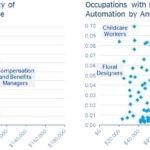Preparing U.S. wage-earners for an economy that puts a premium on social intelligence
If you were pressed to name the skills that are earning a premium in today's job market, you'd likely list software-coding or data analysis. You wouldn't be wrong. But we've found that skills like cognitive and social intelligence, entrepreneurial and leadership skills, the ability to adapt and innovate — skills that can't be automated, in other words, at least not yet — are also earning a premium. And that is good news for low-skilled workers who may be fearful for their futures in a world of unrelenting technological change and globalization.

The presidential election may have laid bare these wage-earners’ anxieties, but it shouldn’t have caught anyone by surprise. At regular intervals since the Industrial Revolution, researchers have attempted to predict which humans will go the way of horses and see their jobs replaced by technology. Today, technology and digitization, also known as general purpose technology, are at the core of the widening gap in wage inequality and wage polarization, as they have spurred the automation of routine tasks, the globalization of labor markets, and the offshoring of U.S. jobs.
Occupations that are most at-risk of automation were telemarketers, title examiners and hand-sewers — each with a 99 percent probability
As incentives grow for managers to substitute machinery for people, workers in some low-skill occupations will indeed continue to bear the impact of skill-replacing technologies. We found that up to 89 percent of occupational categories at a high risk of being automated are in the low- to mid-wage range. Occupations that are most at-risk were telemarketers, title examiners and hand-sewers — each with a 99 percent probability. But several typically white-collar occupations are also at-risk, including accountants, paralegals and technical writers.
Here’s the silver lining: Low-skilled workers willing and able to switch to service-sector occupations that are hard to automate and require social intelligence should see their wages grow. In fact, nearly all job growth within the last three decades has been in jobs with relatively high social skills requirements, and occupations that require high levels of both cognitive and social skills showed the highest wage growth in this period. The Bureau of Labor Statistics estimated that the occupations that will experience that largest wage and salary employment growth by 2024 are largely in the health care and social assistance sector, including home health care services and outpatient care.
It is time for both long-term and short-term policy goals to be tailored to complement the rapid speed of technological advancements and digitization. In the long-term, the reinvention of institutions of educational attainment so they’re building the successful society of the future is the key. Studies have shown that quality pre-school programs have a pronounced positive effect on children from lower-income families. To ensure all children are being equipped with the highly rewarded skills of the future, a higher value should be assigned to skills such as social intelligence and interpersonal communications in early education and pre-school programs across the board.

Source: BBVA Research/BLS/Frey & Osborne
In the short-term, flexible and comprehensive retraining programs are vital to counteract the cyclical waves of job losses due to automation and offshoring. The key to reforming these programs is to improve their ability to provide training for the occupations of future, rather than for the vanishing skills of the past. Initiative should also be taken by private sector companies, which are more aware of the necessary qualifications for their open positions and are thus best suited to provide their own customized training programs.
By investing in human capital, these policies will not only promote equality in opportunity and access, but also promote widespread prosperity.
Shushanik Papanyan and Amanda Augustine are economists at BBVA Compass. Their research paper is available online: “Income disparity, technology and globalization.”